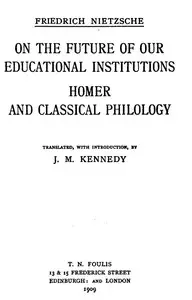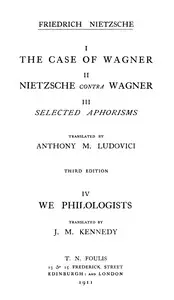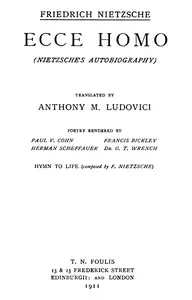"On the Future of Our Educational Institutions" by Friedrich Wilhelm Nietzsche is a thought-provoking analysis of 19th-century education. The author takes a critical look at the German school system and its role in developing culture and knowledge. Rather than simply accepting common educational methods, the narrative questions whether these methods truly foster cultural growth or merely promote practical skills and obedience. The text begins with an introduction that sets the stage for careful consideration of the ideas presented. This opening includes a reflection on a conversation about education's trajectory along with the author's philosophical insights into learning that goes beyond job preparation. This position advocates for a transformation in how we think about education to meet humanity's needs.

On the Future of our Educational Institutions
By Friedrich Wilhelm Nietzsche
Witness a philosophical battle against shallow learning as the author challenges the very foundation of education to pursue a richer, more meaningful future.
Summary
About the AuthorFriedrich Wilhelm Nietzsche was a German classical scholar, philosopher, and critic of culture, who became one of the most influential of all modern thinkers. He began his career as a classical philologist before turning to philosophy. He became the youngest person to hold the Chair of Classical Philology at the University of Basel in Switzerland in 1869, at the age of 24, but resigned in 1879 due to health problems that plagued him most of his life; he completed much of his core writing in the following decade. In 1889, at age 44, he suffered a collapse and afterward a complete loss of his mental faculties, with paralysis and probably vascular dementia. He lived his remaining years in the care of his mother until her death in 1897, and then with his sister Elisabeth Förster-Nietzsche. Nietzsche died in 1900, after experiencing pneumonia and multiple strokes.
Friedrich Wilhelm Nietzsche was a German classical scholar, philosopher, and critic of culture, who became one of the most influential of all modern thinkers. He began his career as a classical philologist before turning to philosophy. He became the youngest person to hold the Chair of Classical Philology at the University of Basel in Switzerland in 1869, at the age of 24, but resigned in 1879 due to health problems that plagued him most of his life; he completed much of his core writing in the following decade. In 1889, at age 44, he suffered a collapse and afterward a complete loss of his mental faculties, with paralysis and probably vascular dementia. He lived his remaining years in the care of his mother until her death in 1897, and then with his sister Elisabeth Förster-Nietzsche. Nietzsche died in 1900, after experiencing pneumonia and multiple strokes.



















